I have been racing MTBO for 8 years now. Seems like a long time looking back! I have progressed (and aged) from junior competitions to elite. It’s been an interesting journey. Full of ups and downs. But finally, I feel that I am starting to realise my potential in the sport.
When I went to University, I called myself an ‘elite’ athlete. I was lucky to be on the Talented Athlete Scholarship Scheme (TASS), which awarded several thousand pounds each to University student-athletes all over the UK. A set number were given out to Federations and I was lucky to get one from British Orienteering for MTBO. I received this for the 3 years I studied, which was a massive help, not only in terms of the financial aspect, but in terms of Strength and Conditioning coaching, mental, nutrition and injury advice, and gym membership.
As I said, I called myself ‘elite’, despite arriving for my first S&C session having never squatted, or bench pressed! Furthermore, on being released from the parents, and home cooking, I was under the impression that ‘as an elite athlete’ I could eat whatever I wanted. So I did. My skinny 55kg runner frame that went to Uni, came back after 18months a chunky and sluggish 65kg.
In 2008, I set myself the goal of achieving 6 JWOC and EJOC medals. I trained ‘hard’ for a year. But that was difficult because in Sheffield there are hills. And rocks. Which as a novice cyclist with limited skills, presented a problem. And I knew very little about bike maintenance. I hooked up early on with the newly established Sheffield Hallam Cycling club. At the time full of downhillers, who regularly frequented Steve Peats’ Wharncliffe Woods. I sometimes tagged along to tackle DH runs on a hardtail. But there were also a handful of XC riders. We took long 5-6hours tours around the Peak District once a week over the winter even if it was raining or blowing a gale. Sometimes, we would take a train out, only to find bad weather, and go and sit in a cafe for the morning! Slowly my technical riding came along, my confidence increased and I didn’t fall off every time I saw a rock.
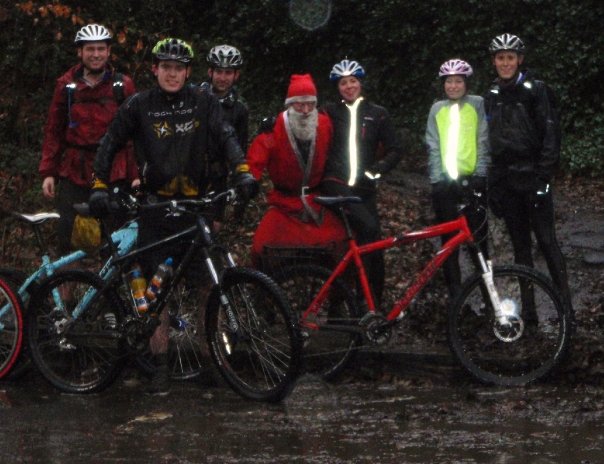
A christmas ride with Sheffield Hallam Cycling Club. Pouring with rain and freezing, but at least Santa made an appearance.
I slowly started to spend increasing amounts of time in the gym and gym classes. Gym classes, while fun, were fairly useless for training apart from building up hours, but at the time, I believed they were of great benefit. In the gym, I progressed from 20kg squats to 40kg squats where I then plateau’d for a few months.
So despite training, it was unconstructed as I had no coach. Furthermore, with few MTBO events in the UK, I had very little MTBO practise in the lead up to JWOC in Poland. Despite having the races as my major goal for the year, I was focussed on the result, not the process. It’s easy to look back now and say ‘I should have made my own training with maps’ but as a student, travelling around the country to access good maps wasn’t financially viable. I needed the money to attend my international races. It was a catch 22 situation with a limited pot of funding.
The sprint race was around University campus and was my first experience of urban MTBO. It was not a good experience. I lost my head too many times and ended up 9th. The middle distance the following was better, but I changed my mind too much and just missed out on 6th place. I fared better in the long qualifier, a no pressure race, just to get all the controls. I won, and was really happy to do so, thinking that finally everything was coming together. In the long final, however, I fell apart, came together and fell apart again. Too many mistakes, and too may bizarre misses that mystify me to this day!
So my first JWOC experience (and the first MTBO JWOC) saw me improve my results as the week progressed, 9th, 7th and finally a 4th. It was a far cry from the results I wanted but I knew I still had another chance to redeem myself at EJOC a month or so later in Lithuania.
In Lithuania I fared a little better results wise, and managed to have two mostly solid races. The middle was a disaster at many points, but miraculously, I still took bronze. The competition field was depleted in comparison to JWOC a month previously, but to me, it was the result that mattered. In the sprint I had a storming ride, but lost concentration and didn’t see a fence on the map. The 40 second mistake cost me the gold medal. I lost by 1.3 seconds; an even closer margin than the year before. The long distance was my final chance to succeed, and it was close. Unfortunately I misunderstood some key information about the use of the main road, and didn’t see this as a route choice as I thought it was forbidden. That cost me two minutes and another gold medal, despite the rest of the race being very good.
As I sat on the seafront waiting for the rest of the GB team, I realised that my performance and results had improved with each race I did. I understood then that I couldn’t expect to compete to a high level without training my orienteering skills.
Over the years, I’ve been left to make my own way in the sport. Since 2009 MTBO has seen no support from British Orienteering and very little from British MBO (prior to 2009 support came in the form of a small amount of funding which typically covered a couple of entry fees, but nothing else). Most of my ‘revelations’ in the sport have come about simply because I slowly came to the understanding of what needed to be done to improve. A little guidance and a bit of external coaching should have helped me realise I needed more map training time earlier. Despite this acknowledgement while sat on the seafront, it still took me until 2012 to really understand the purpose of map training and to start getting it right with Hans Jørgen’s guidance and knowledge.
Throughout the winter and spring, my whole focus became JWOC in Denmark in 2009. Nothing else mattered, not even my studies, and I ended up failing an assignment twice, before finally scraping a pass on the third attempt. Not good. I started to do some more MTBO training around Sheffield and my decision making started to improve, as well as my speed of orienteering. My technical skills on the bike were coming along, very slowly.
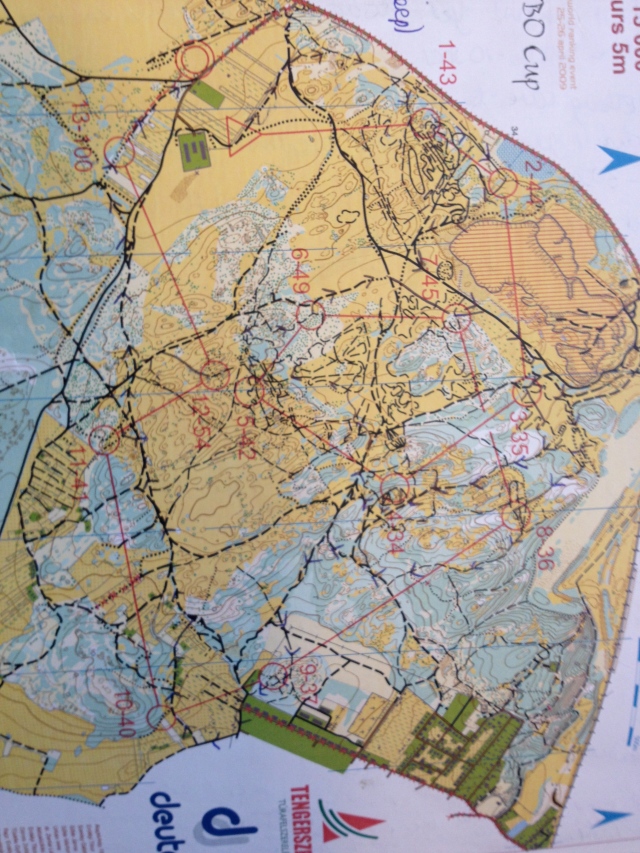
My first real experience of shortcutting. Hungary WRE 2009. The lessons I learnt here took me to a WOC silver in 2012. The route on the map doesn’t show how many stops I made or how confused I was at times!
I made a huge committment to travelling to Europe regularly for MTBO events, as after the 2008 season I realised I had to get to more races to compete against the top athletes. I started with my first Danish Training Camp where I raced the elites. I took in Hungary, before going to Portugal over my birthday. Then I went to Switzerland and onto Italy with the Austrian/Swiss team for a week long camp. I particularly remember the first training ride with them in Italy, where it was agreed to make some hours easy training, up the mountain and back down. This was far from easy training for me, and I pushed hard to stay with the group on the uphill. At the top I was proud and shattered to have made it without being dropped. Only then came the downhill, which resulted in me watching Michi Gigon in awe as she dropped off in a controlled fashion down the steepest hill I had ever seen! I was so afraid to bike, that I ran down most of it until I was persuaded to try! After this I had a 6 week training block in the UK, and a one week taper before Denmark. I was so desperate to win, that I trained hard for 6 weeks and only allowed one week to recover. When I later looked back at Denmark, I realised I had no idea how to taper and peak for a race. My years in foot-o had only taught me to take 1-3 weeks with reduced volume, which in reality is useless. During the races I felt I had heavy legs and was getting increasingly desperate for a medal as the week progressed.
In the sprint I rode a good race to take 4th, but had made some small time losses that really counted against me. In the middle distance I was going well, but when riding up a hill, my chain dropped over the back of the cassette and jammed between the spokes. I spent a couple of minutes trying to pull it out and was then overtaken by Barbro Kvåle, who was on her way to take silver. I was gutted to lose a medal due to a mechanical problem and I ended up 6th. For the long, I pushed as hard as I could, but somehow after 90 minutes of racing, I was 7 minutes behind the leader. It was a total mystery how everything could go so wrong and I was devastated.
Some days later I went to Pilsen for the 5-days, with a small group of Brits. It was fun to relax and be able to race with no pressure in the elite class. I took two top 10 placings, and 3 top 20’s so I was pleased that I felt I was getting stronger again. I still couldn’t talk about JWOC without getting upset and it became a taboo subject for a few months. With WOC in Israel at the end of August, I knew after my better performances in Pilsen that I should keep training for this.
I tried a new training method and taper plan that seemed to work. 10 days of 4x4x4 intervals. Maximum. 4 reps of 4 mins max, and 4 mins easy. No other training, just warm up, intervals, cool down for 10 days. Alternating one and two sessions per day. It’s tough. It hurts. But actually, it was the right thing to do for me at the time.
This seemed to boost my endurance capacity and speed (although the intervals were all uphill and on road), and I took two 8th places at WOC. After that first top 10 place, I was sat in the pool, struggling to believe that I had been fighting for a top 6 position until the final controls where the 40°C heat got to me. An 8th place within shouting distance of the podium, was unbelievable after the disaster of Denmark. But, I managed to back it up with another 8th in the sprint race some days later. The long distance on the other hand was a catastrophe. With the hottest temperatures of the week, and 2 hours of racing, I suffered badly from dehydration and the heat. Towards the end of the course, I had to stop and sit down on several occasions just to muster the energy to finish. This experience in the long contributed to my ‘mental block’ I suffered for a few years when it came to long distance races. Prior to this the long was one of my favourites, but after I could barely muster the motivation to push myself for the duration of the race.
It was a mixed year, and now I can look back and understand what went wrong, but at the time and for months after, it was impossible to make sense of it. I wish what had happened hadn’t affected me so, but it did and the knock on effect lasted a couple of years.
What did go wrong?
For a start, I think I actually wanted to win too much. I became over focussed on the medal itself, rather than the process to get there. In a strange way, I felt that being ‘the’ MTBO’er from Great Britain made me good already. I was very extrinsically focussed, on everything around me and people’s impression. I wanted to dominate, and thought I was already there. But on the other hand, I was training hard before JWOC and putting in more hours than I had previously. But it was the wrong sort of hours and training.
My PC broke just after JWOC so all my Polar HR data has been lost. I only have my memories of what I did, rather than solid facts. Most of my training was at a moderately hard intensity. Living in Sheffield meant hills, and as I was still fairly new to cycling, riding up at a high HR didn’t bother me. I neglected everything to do with JWOC itself and only ever thought about the final outcome. I probably only spent an hour or two in total looking at the previous maps, but it was just looking. There was no thought behind what I was looking at or what I should be looking for.
I had the potential to take medals. I should have taken medals. But I didn’t. It took another 3 years to understand why I didn’t, and how I could change that for the future.
Part 3 will explore officially becoming a W21 in 2010 and 2011, my taking a break from MTBO and graduating.

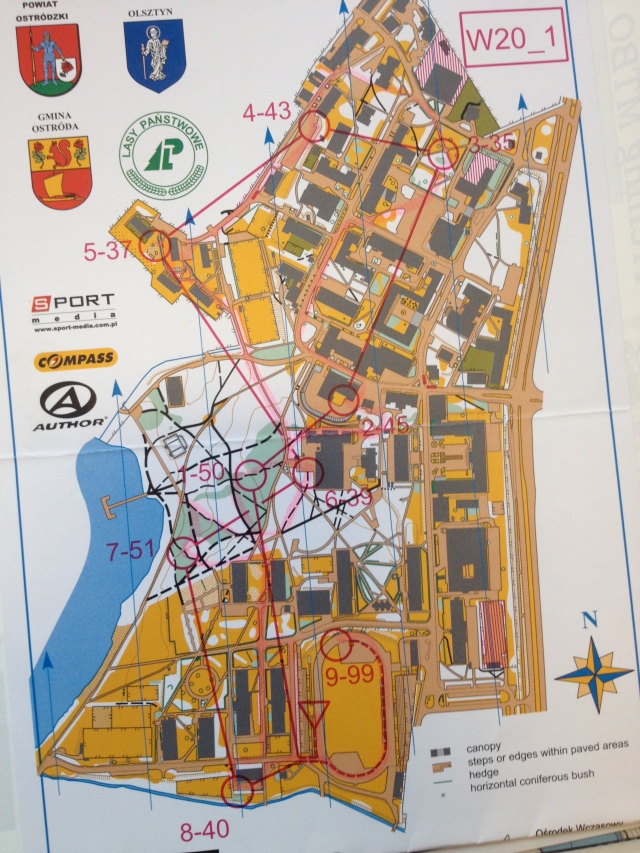
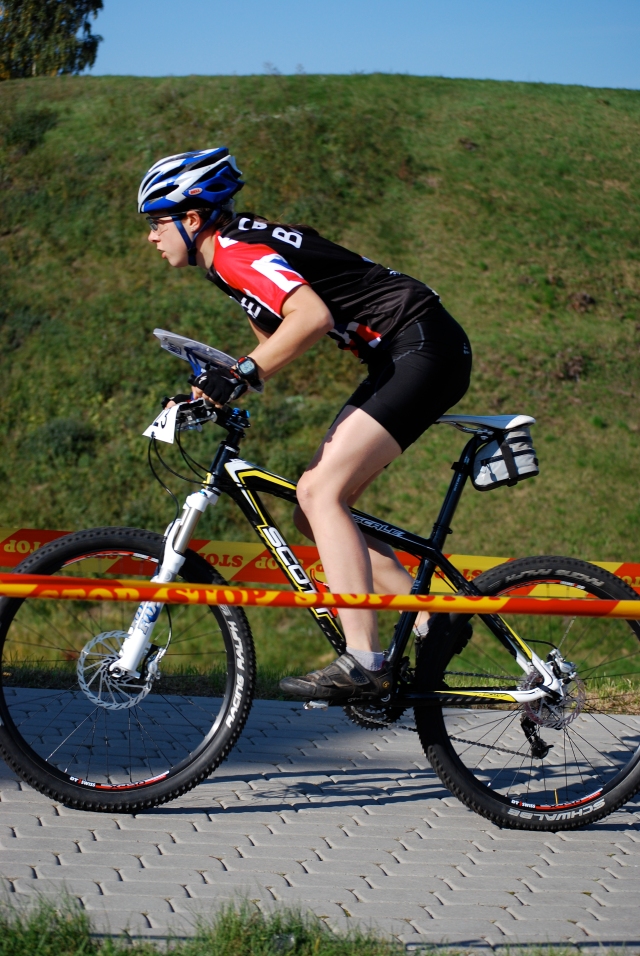
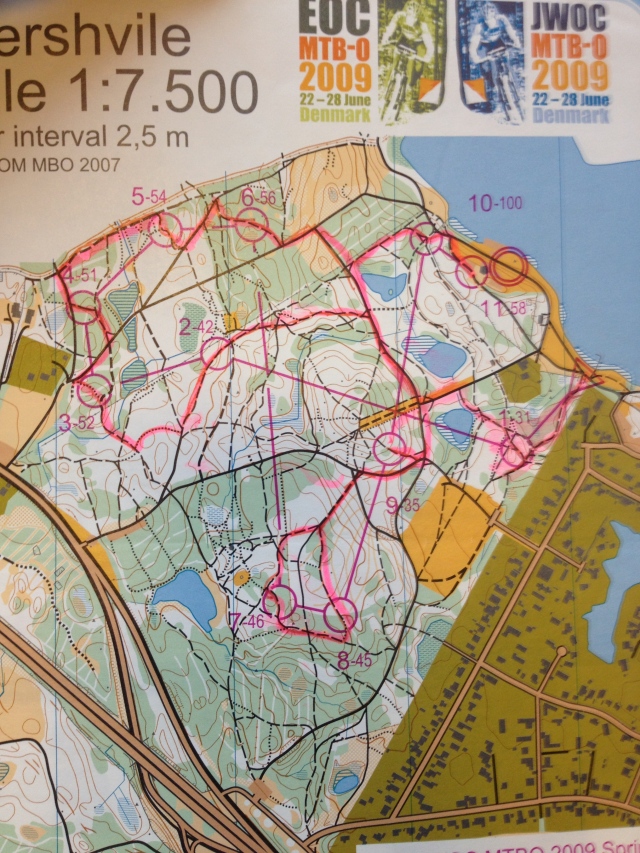
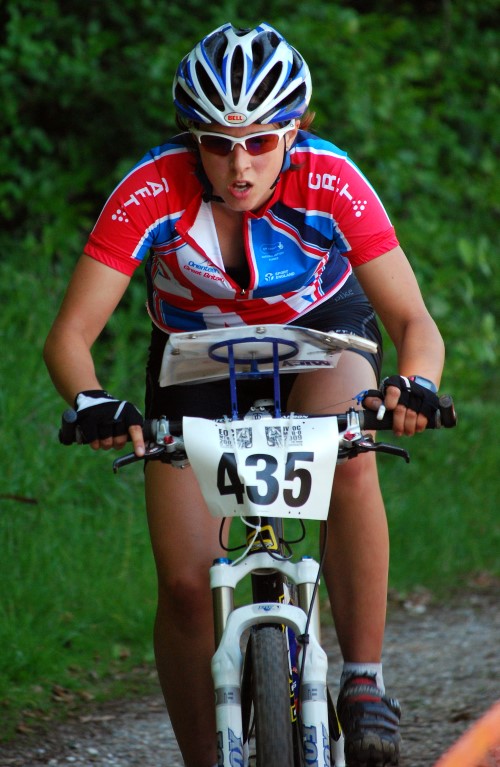
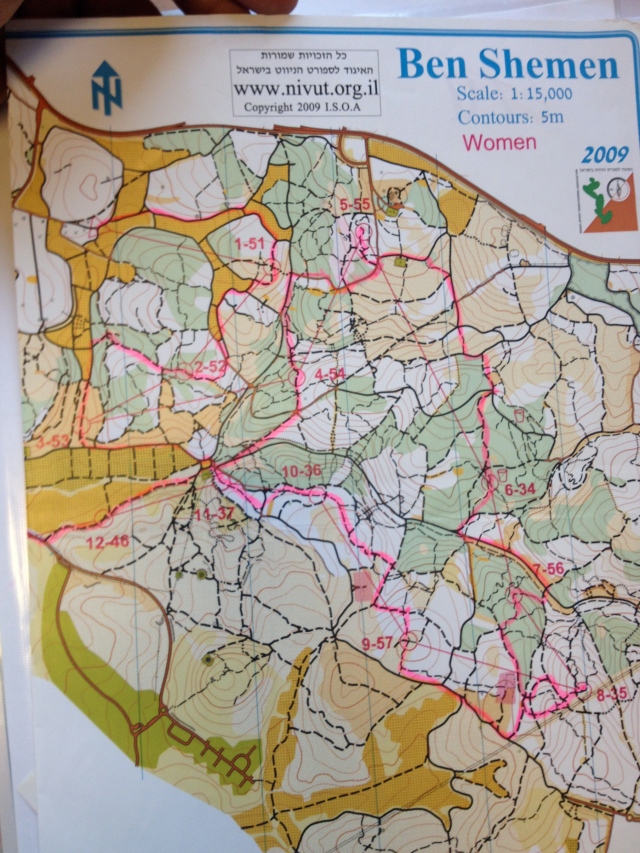


Hi Em,
A very interesting read, looking forward to the next part! all the best, Iain